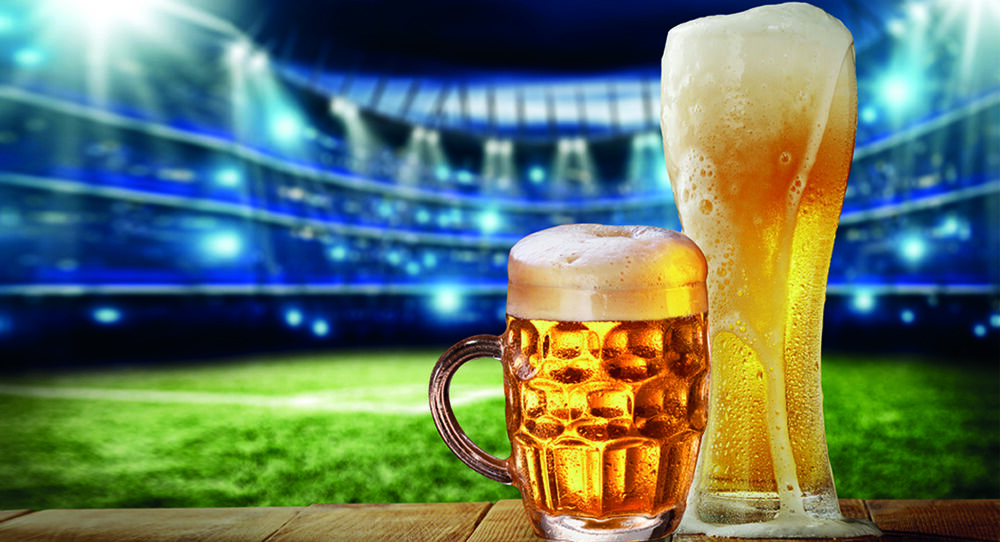There’s nothing quite like the tribal emotions of a live football match. The smell of the crowd, the songs, the camaraderie, the unfettered joy of victory and the shared grief when your team loses. The next best thing is jumping up and down in your favourite pub, screaming at the screen and spilling your pint when your team bags the winner in the last minute. It’s undoubtedly a great shared British experience.
The cost of showing televised sport in licensed venues is pretty daunting for landlords. The average charge to pubs and bars showing both Sky and BT sports was around £20,000 [1] per year in 2018, and with 168 Premier League’s games available to show throughout the season, the cost per game is not insignificant. If the average pint costs £4.50 then pubs need to sell over 25 pints to bring in the revenue to match the price of a match. Once overheads like VAT, duty, distribution and brewery costs are taken into consideration, landlords need to sell considerably more per match to make a profit, but how?
One avenue worth exploring is diversifying the selection behind the bar to cater for customer taste. Successful bars aren’t just content on serving their sports fans with standard lagers and ales. The CGA feel that common or garden fare is being put under continuing pressure by the premium and craft beer options and, although in slight decline of late, Cask or ‘Real’ Ale. To the pub trade in general, Cask Ale is worth over £1.5 billion per year, with a share more than Gin and Rum combined, is not to be sniffed at as a traditional and viable sales option for pub events. The average Cask Ale drinker is older, more likely to be male, with more disposable income and drinks out more regularly. This is a customer demographic which could be seen to match that of the average ‘pub footy’ fan, so it seems prudent to cater for that inquisitive palette. As it’s a ‘live’ product, Cask has a relatively short shelf life and whilst this may be off-putting for some venue managers, there could be some strength in ‘featuring’ selected beers for individual sporting events.
Last summer, with the hot weather and England’s long run in the World Cup, there was a 4.4% growth in beer sales [2] which was refreshing news, and another long summer could yet stave off Brexit worries for people tightening their purses at the bar. However, there’s no summer football this year, so when the Premier League season finishes, the Championship playoffs are over and the FA Cup and Champions League trophies have been held aloft, how will pubs and clubs maintain their custom?
Results from a 2018 survey by MatchPint [3], the pub and event location search engine, was insightful into how pubs and bars can diversify and improve their offering during the off-season and non-match nights. It was found that 50% of the participants said they mainly watch football in a pub and almost half of those respondents were also interested in rugby and boxing and a smaller share would happily watch cricket. This suggests that whilst football still commands the largest audience, it is still only half a sales opportunity.
Speaking at a Morning Advertiser event last summer, MatchPint’s co-founder Dominic Collingwood said,
“Paying for Sky and BT and only showing premier league football is like buying a keg of beer and selling 35 pints, then throwing the rest in the bin”
According to Collingwood, pubs and bars need to up their game and create a point of difference in order to keep people involved in the pub community and off their sofas, phones, tablets and smart TVs. If the pub experience is worth returning to then people will.
Pubs and bars could broaden their sports range to include more marginal sports. Boxing, Mixed Martial Arts and the ever-popular UFC could bring custom. Rugby League has been a summer sport for some time now and BBC offered 57 free-to-air matches [4] last season. The Superbowl has always been a big draw and NFL is growing in popularity in the UK. The onus is on venue managers to tie in themed promotions and offers with a carefully curated sports and events calendar.
Venues need to reflect their communities, improve their social network presence and encourage their customers to share their experiences. Improvements to the sporting and event experience could encompass an investment in bigger HD screens and gaming machines, provision of fan commentary and introduction of mobile-phone ordering and table service for drinks and food.
Real world sports need not only be the only attraction, there’s a current trend for pubs and bars to install retro gaming machines and to even host eSports events on X-Box or PS4. Venues could have their own leagues and even play other bars on match nights.
Food, sport and beer for thought!
[3] https://www.morningadvertiser.co.uk/Article/2018/12/03/Beer-sales-in-2018


